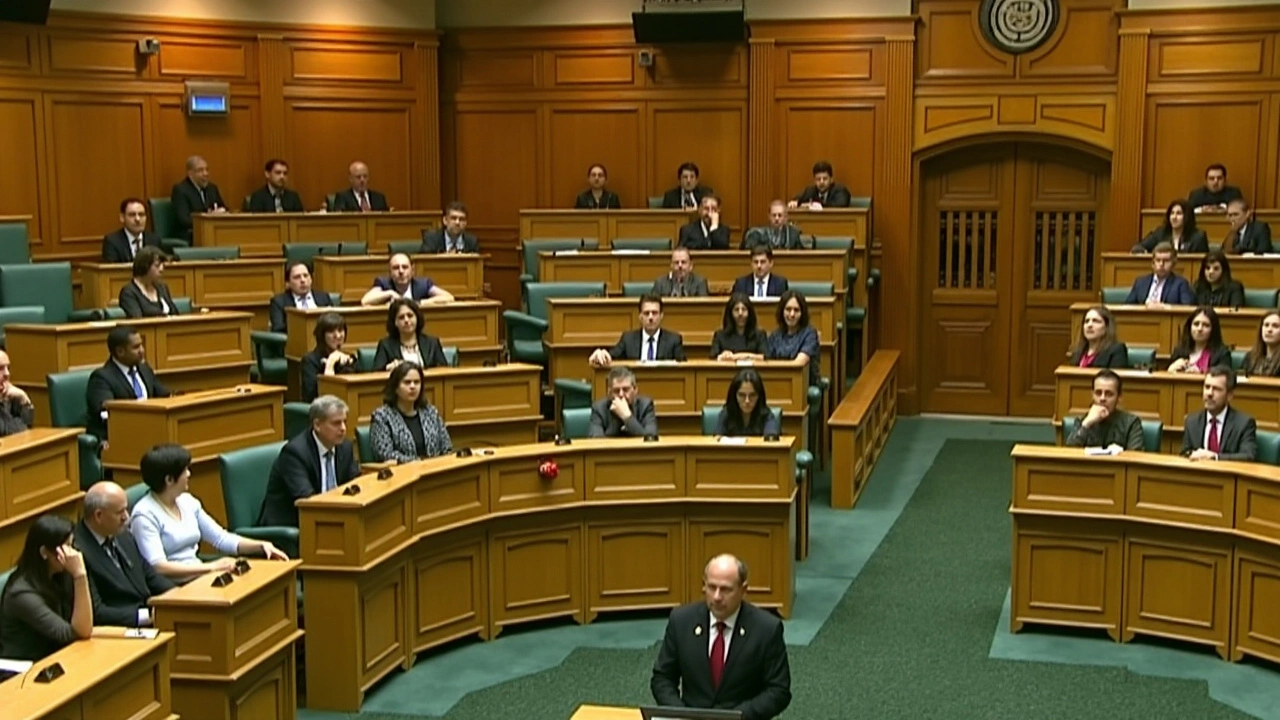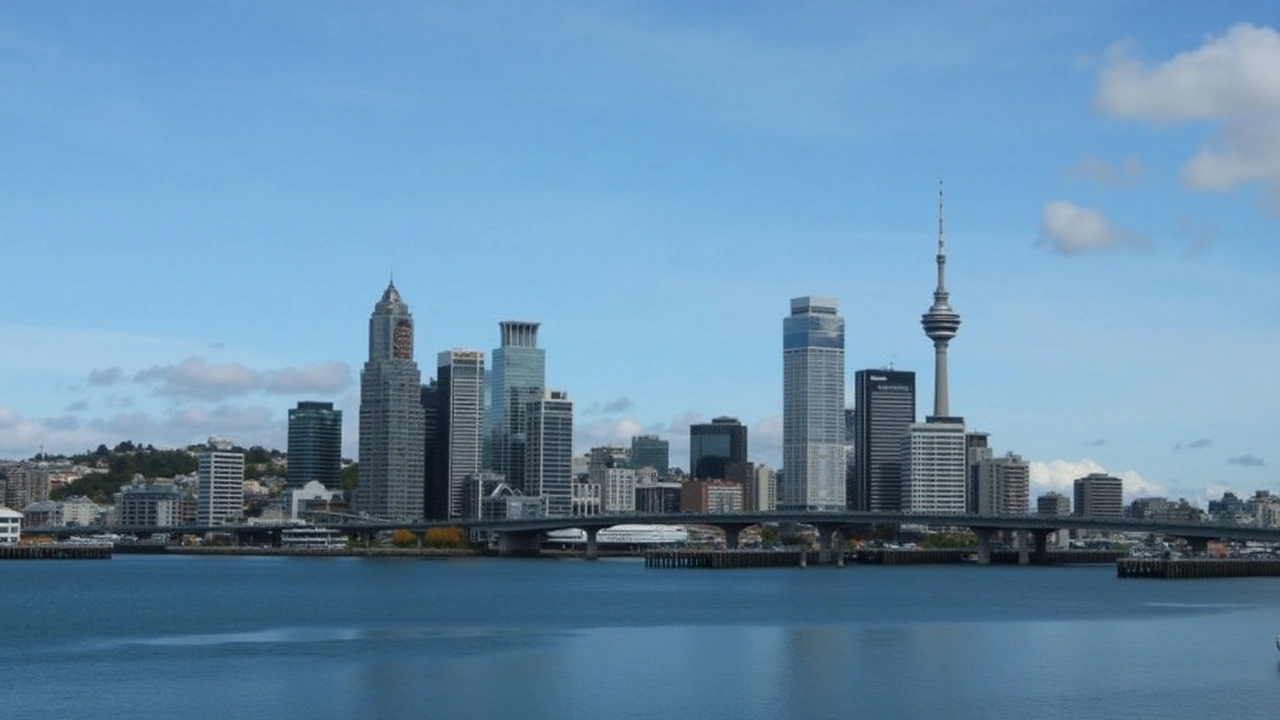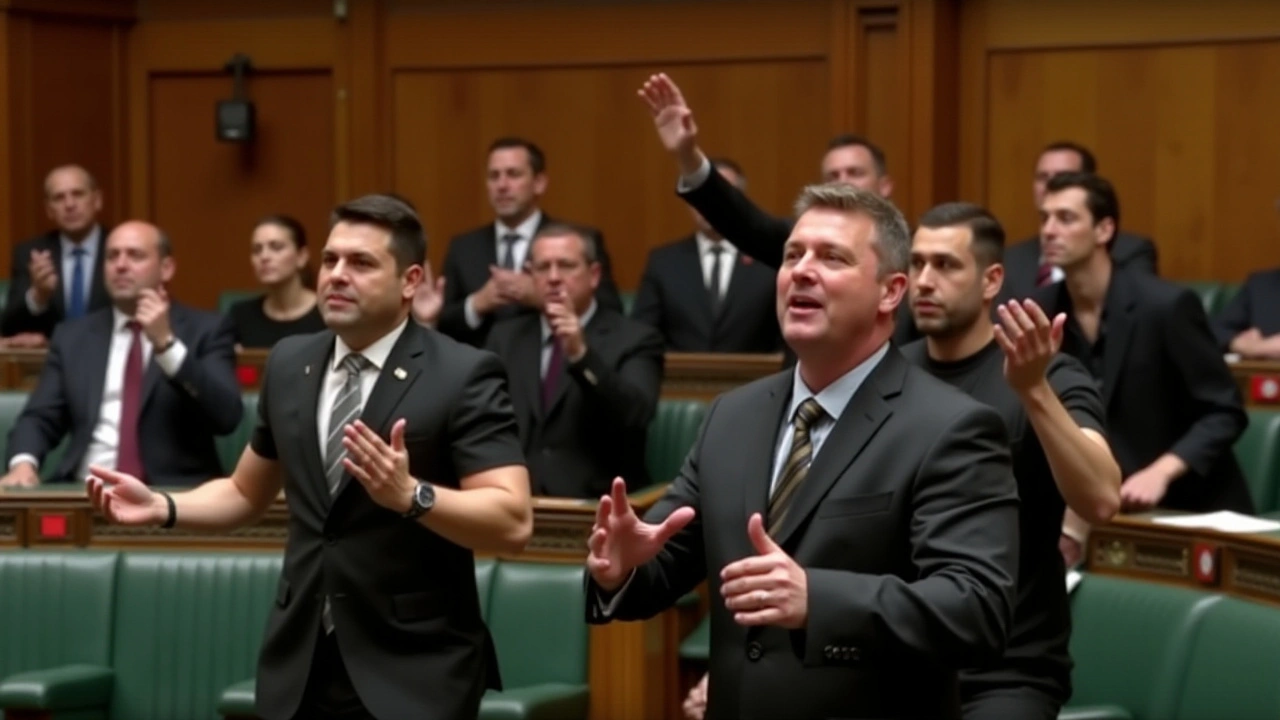Maori Haka Protest Sparks Parliamentary Disruption in New Zealand
In an unprecedented display of cultural resistance, New Zealand’s parliament was thrown into chaos this past Thursday when Maori members staged a haka protest against a controversial treaty bill, leading to the session’s temporary suspension. The disruption came as a response to a legislative proposal from the ACT New Zealand party that aims to reinterpret the Treaty of Waitangi, a cornerstone in New Zealand’s history. The proposed redefinition has stirred deep concerns among the Maori community, sparking fears that it could undermine the rights afforded to them under the 1840 treaty agreement.
The protest was led by members of Te Pāti Māori, including the notable Hana-Rawhiti Maipi-Clarke. The protest did not merely stop at delivering speeches but escalated into a passionate haka performance. The haka, a traditional Maori dance known for its vigorous movements and vocal expressions, was accompanied by the symbolic gesture of tearing a copy of the bill. Such a dramatic intervention captured the attention of lawmakers and gallery spectators alike, whose chants soon echoed through the chamber, temporarily drowning out parliamentary proceedings.

The Treaty of Waitangi: Historical Significance and Modern-Day Challenges
The Treaty of Waitangi serves as a historic agreement between the British Crown and over 500 Maori chiefs, setting the stage for governance in New Zealand. Over the years, it has been the bedrock for numerous judicial and tribunal decisions that gradually expanded the rights of Maori people. However, the treaty has not been without its critics. There are those who argue that these expansions have skewed in favor of Maori at the expense of non-Indigenous residents, igniting debates over equality and discrimination.
David Seymour, the leader of ACT New Zealand, has taken a firm stance on the reinterpretation of the treaty. Seymour contends that the bill’s opposition is rooted in fear-mongering tactics that aim to divide the nation. In defending the bill, Seymour claims his mission is to empower every individual, regardless of their ethnic background. This perspective, however, finds little resonance among Maori leaders and their advocates, who view the bill as a direct threat to their community's hard-earned rights. Maori represent around 20% of New Zealand’s population, making this bill a significant issue for a substantial portion of the country’s citizens.

Hikoi: A Nine-Day March for Maori Rights
The parliamentary haka protest is just one ofthe many manifestations of the widespread Maori resistance to the treaty bill. Hundreds of Maori, alongside their allies, have taken to the roads in a hikoi, which is a traditional form of protest that involves a nine-day journey by foot. This march spans from the northern regions of New Zealand to the capital city of Wellington. As these determined marchers make their way through various towns, they hold demonstrations to raise awareness and garner support for their cause. Their trek is slated to conclude in Wellington by next Tuesday, where they plan to culminate their efforts in a massive rally. Estimates suggest tens of thousands are expected to join this final demonstration, signaling a powerful collective voice against the legislative proposal.
The Road Ahead: Uncertain Parliamentary Future for the Bill
Despite having successfully passed its initial reading, the treaty bill's future remains uncertain, marred by political complexities and the evident Maori opposition. The coalition partners, the National Party and New Zealand First, extended their support only through the bill’s first reading—a strategic move as part of their coalition obligations. However, both parties have clarified their lack of intent to support the bill’s passage into law. Given this lack of backing from crucial political factions, the bill’s failure to progress appears highly probable.
The Maori haka protest in parliament, coupled with the determination of the ongoing hikoi, might very well underline the unyielding Maori resolve to protect their rights and heritage. At its core, this movement represents more than just political maneuvering; it is a call to preserve the integrity of an agreement that has been central to New Zealand’s history and societal fabric. As the debate rages on, the coming days will be crucial in determining the bill's fate and, by extension, the future course of ethnic relations in New Zealand. The outcome will serve as a reminder of the power of indigenous voices and the essential place of cultural traditions in informing contemporary dialogues on rights and identity.







JAN SAE
Wow, what a powerful statement of identity, and what a vivid reminder that cultural protocols still matter!!! The haka in the House was not just a performance, it was a seismic call for recognition, a living constitution in motion!!! As a coach I see this as a training ground for solidarity, where each stomp echoes the heartbeat of a people who refuse to be silenced!!! Keep the momentum, keep the voices loud, keep the bill under scrutiny!!!
Steve Dunkerley
The parliamentary disruption underscores the legal principle of tikanga as an interpretive framework within statutory construction, thereby challenging the proposed statutory reinterpretation of the 1840 Treaty of Waitangi. By invoking kaupapa Māori, the protest operationalizes epistemic sovereignty, compelling legislators to consider the doctrine of partnership enshrined in common law precedents such as R v Symonds and Wi Parata. The act of tearing the bill functions as a performative negation, signaling a repudiation of legislative overreach and a demand for compliance with the United Nations Declaration on the Rights of Indigenous Peoples. Moreover, the strategic timing aligns with procedural safeguards stipulated in the Standing Orders, amplifying the political capital of the iwi constituencies. This confluence of cultural praxis and procedural nuance illustrates the intricate interplay between decolonial praxis and parliamentary sovereignty.
Jasmine Hinds
Love the energy of the protest! :)
Madison Neal
Absolutely, the integration of tikanga into legislative discourse is essential for genuine bicultural governance. Your articulation of the jurisprudential context highlights how the treaty's principles are more than historical artifacts-they are living legal instruments that must inform policy. By foregrounding the UNDRIP framework, you reinforce the global obligations NZ has upheld. This synergy between cultural praxis and legal theory strengthens the case against any reductive reinterpretation of the treaty.
John Crulz
Reading about the haka in the chamber reminded me of how protest can be both theatrical and deeply substantive, a blend that’s rare in modern politics. On one hand, the sheer spectacle of warriors chanting and moving in unison commands attention; on the other hand, it carries centuries of legal weight that you can’t just brush off. The bill’s attempt to reinterpret the Treaty of Waitangi feels like a rewrite of the social contract, and that’s a massive leap for any government, especially when the original agreement was founded on mutual respect. While I get the desire for a “one‑size‑fits‑all” approach to policy, it’s crucial to remember that the treaty’s clauses were negotiated amid very different power dynamics. The haka served as a reminder that the Māori perspective isn’t a footnote; it’s a core component of New Zealand’s constitutional fabric. In practical terms, any amendment that threatens those rights could ripple through land courts, health services, and education policies, complicating everything from resource allocation to cultural competency training. Honestly, it’s kind of like trying to edit a codebase without understanding the dependencies-you end up breaking things you didn’t even think were related. The Parliament’s pause was a necessary reset button, giving everyone a moment to breathe and reflect before rushing to a vote. It also shows that protest isn’t just about shouting; it’s about creating space for dialogue, even if that dialogue comes in the form of rhythmic stomps and fierce eyes. The broader public sees the drama, but the underlying message is about safeguarding indigenous sovereignty, which is a non‑negotiable principle for many. If the coalition partners are truly on board with a respectful partnership, they should champion the treaty’s integrity rather than look for loopholes. Moreover, the hikoi marching across the country amplifies the local grievances into a national narrative, turning isolated protests into a cohesive movement. The sheer scale of ten‑thousands joining the final rally could shift the political calculus in ways no single MP anticipated. In short, the haka wasn’t just a protest; it was a cultural protocol that forced the legislative machine to reckon with its own foundations. So, let’s keep the conversation going, respect the customary practices, and remember that real change comes when policy meets lived experience head‑on.
Anita Drake
You've captured the multifaceted impact of cultural protest on legislative processes very well. Recognizing both the symbolic and practical dimensions helps frame the debate in terms that resonate across constituencies. Engaging with the treaty's principles while fostering inclusive dialogue will be key to any sustainable resolution.